Have you ever wanted to know if your Bengal cat is really healthy? Bengal cats are part domestic and part wild, making them very special. They are a mix of domestic cats and the Asian leopard cat. This mix gives Bengal cats a unique energy and beauty.
Bengal cats, says Jennifer Frione, need to stay active and mentally stimulated. They are full of energy and love to play. If you own a Bengal cat, it’s important to know what a healthy cat looks like. This helps them stay happy and live a vivid life.
Key Takeaways
- Understand the vitality traits of a Bengal cat stemming from their wild ancestry.
- The importance of recognizing signs of a healthy Bengal cat for long-term well-being.
- Veterinarian advice on maintaining the high-energy lifestyle required by Bengal cats.
- Physical and behavioral indicators of a healthy Bengal cat.
- Best practices for ensuring a fulfilling life for your athletic and curious Bengal.
Understanding Bengal Cat Vitality
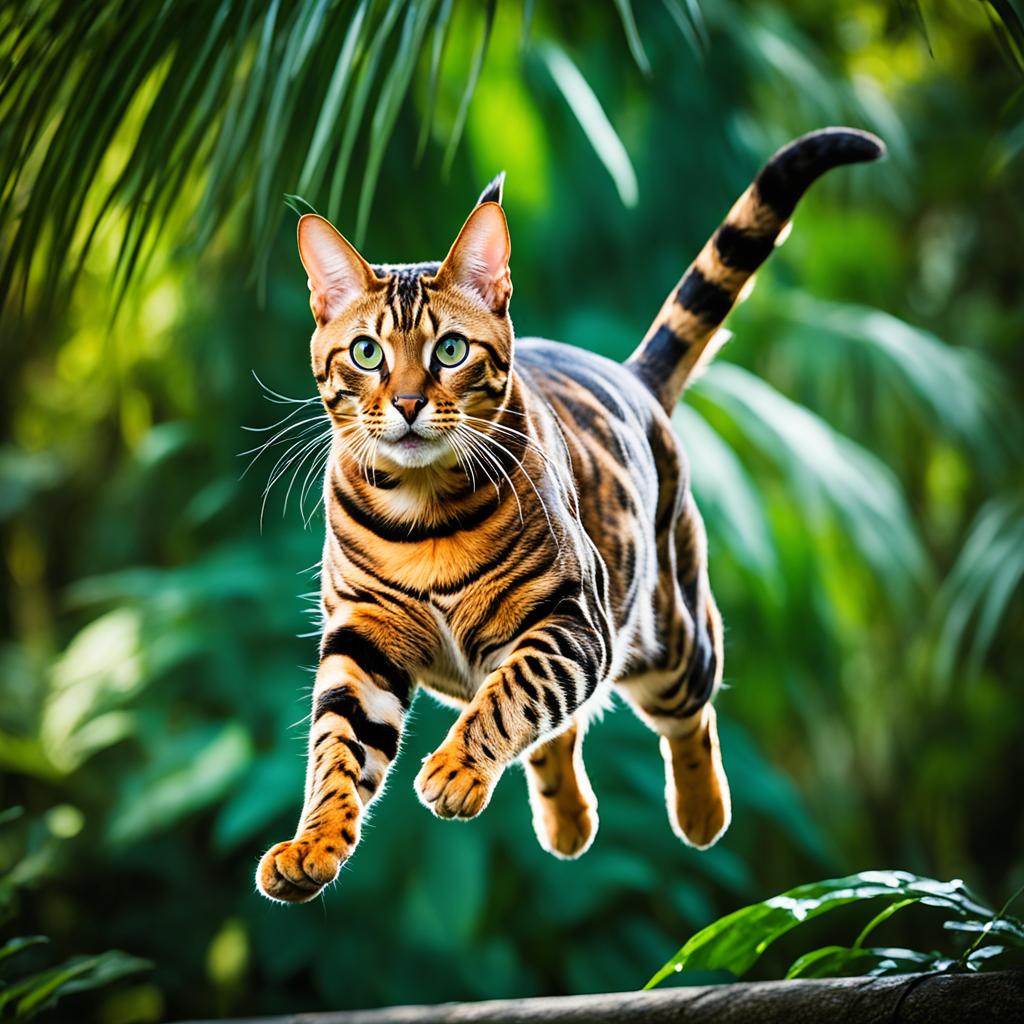
Bengal cats are known for being full of life. It’s easy to see they are doing well. They love to play and are always curious about the world around them.
Energy Levels
Bengal cats are full of energy. They love running around and climbing. Providing them with toys and play areas can help keep them happy.
Alertness and Curiosity
Bengal cats are very alert and curious. They love to explore. To keep them happy, they need toys and puzzles that challenge their minds.
What Are the Signs of a Healthy Bengal Cat?
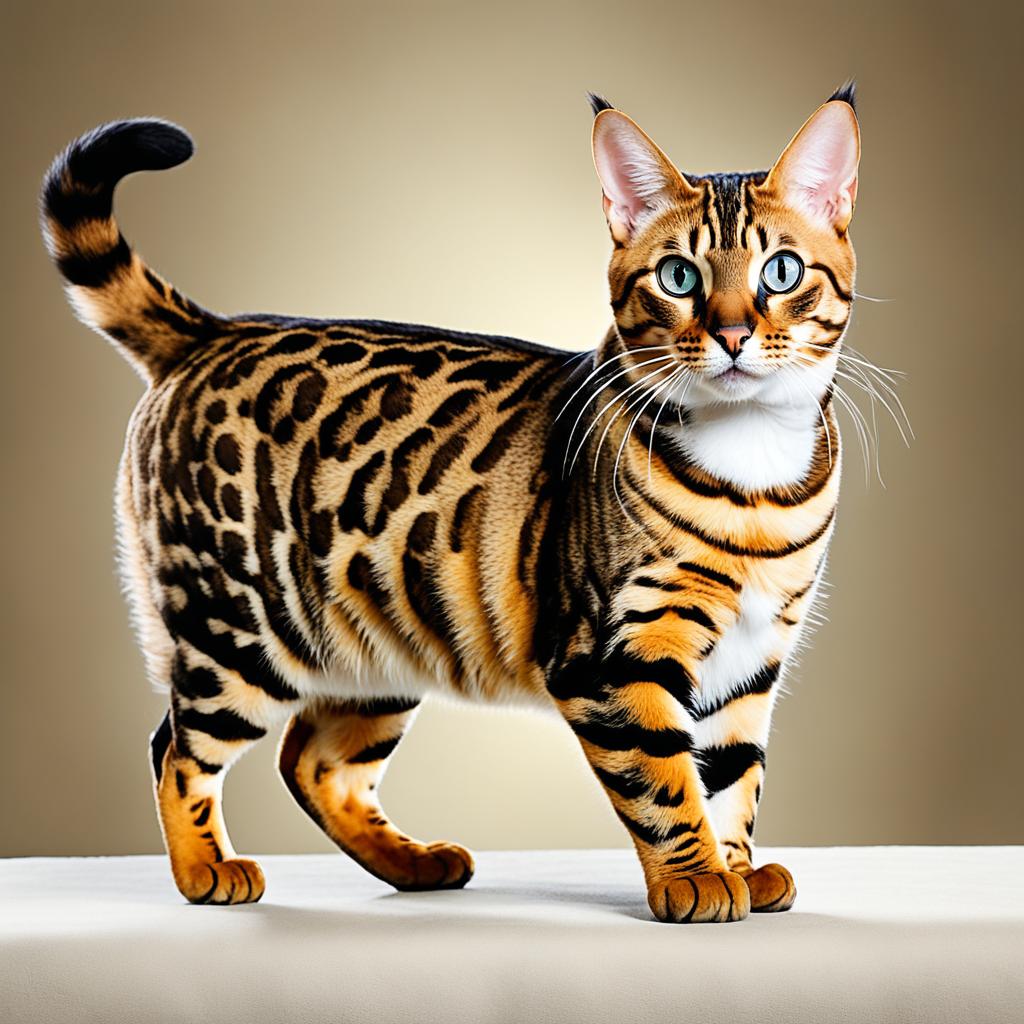
A Bengal cat that looks healthy is truly stunning. There are some clear signs to look for. These include a shiny coat and bright eyes. These show that the cat is doing well. Let’s explore what makes a Bengal cat healthy.
Glossy, Shiny Coat
The coat of a Bengal cat says a lot about its health. A shiny, silky coat means the cat is in good shape. This kind of fur comes from a good diet. Keep your cat’s coat looking beautiful with the right food.
Clear, Bright Eyes
Clear, bright eyes are another sign of health in Bengal cats. They show more than just good vision. Healthy eyes reveal a cat that’s in great health. Make sure your cat sees the vet regularly to keep their eyes in top shape. This helps them stay lively and healthy.
Recognizing a Well Bengal Cat Through Physical Appearance
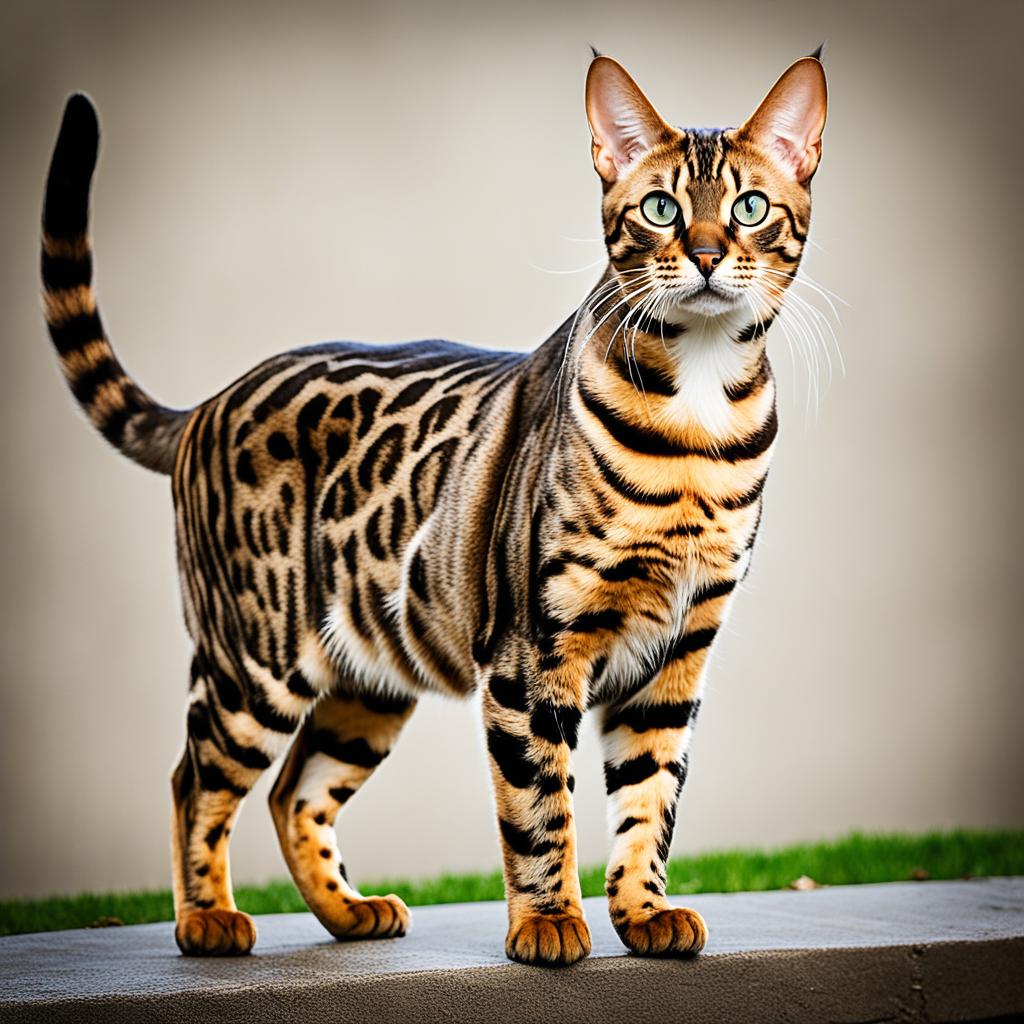
It’s important to look at your Bengal cat’s physical traits to see if it’s healthy. They show signs of being fit and strong because they come from wild cats.
Muscle Tone and Body Condition
Healthy Bengal cat characteristics include strong muscle tone. A Bengal cat in good shape will have firm muscles. This shows their active nature and links back to their wild roots.
When you touch your Bengal, you should feel solid muscles without much fat.
Healthy Skin and Fur
The signs of a strong Bengal cat often start with its sleek coat and soft skin. A healthy Bengal has glossy fur that feels smooth. Good skin and fur mean they’re getting the right care and food.
Brushing them regularly keeps their coat looking great and helps you spot any skin problems early.
To check if your Bengal is well, look at their muscles and their fur. These tell you a lot about how healthy and lively they are.
Healthy Bengal Cat Characteristics: Behavioral Indicators
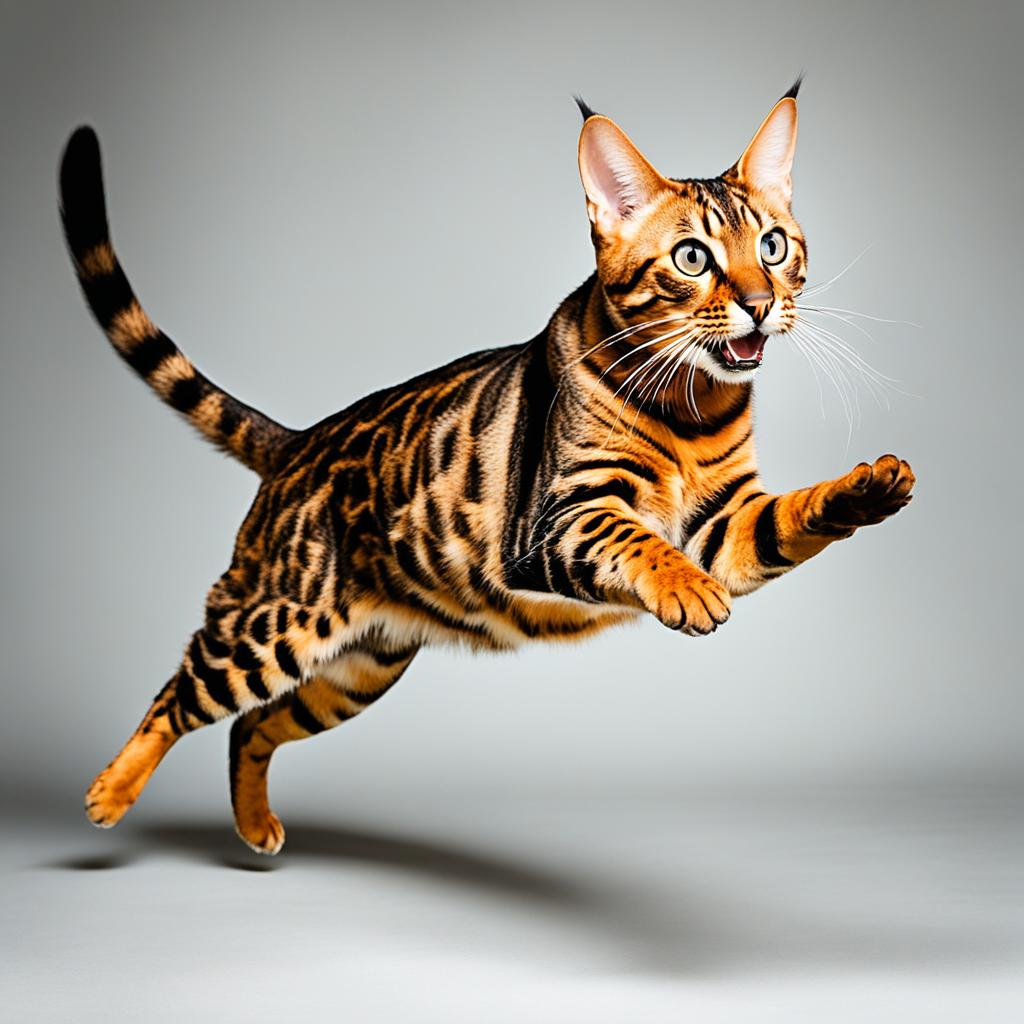
How do you know if a Bengal cat is healthy? Look at how they act. If they are lively and playful, it usually means they’re in good health. Bengal cats are famous for being active and enjoy spending time with their people. These points tell us a lot about Bengal cat health.
Playfulness and Activity
If a Bengal cat plays a lot, it’s often a sign they are doing well. They have a lot of energy. This shows in how much they enjoy toys, climbing, and checking out new places. Playing often, which includes games with you, is crucial. It keeps their mind and body strong.
Interactivity with Humans and Other Pets
Bengals are meant to socialize with people and other animals. This interaction is key for their well-being. It meets their social needs and strengthens the bond between them and their families. It’s great for their happiness and health.
Encouraging these traits helps your Bengal stay healthy and happy. Their active nature is a good sign of their well-being. This is how you tell if a Bengal cat is healthy.
Bengal Cat Wellness Indicators: Nutritional Signs
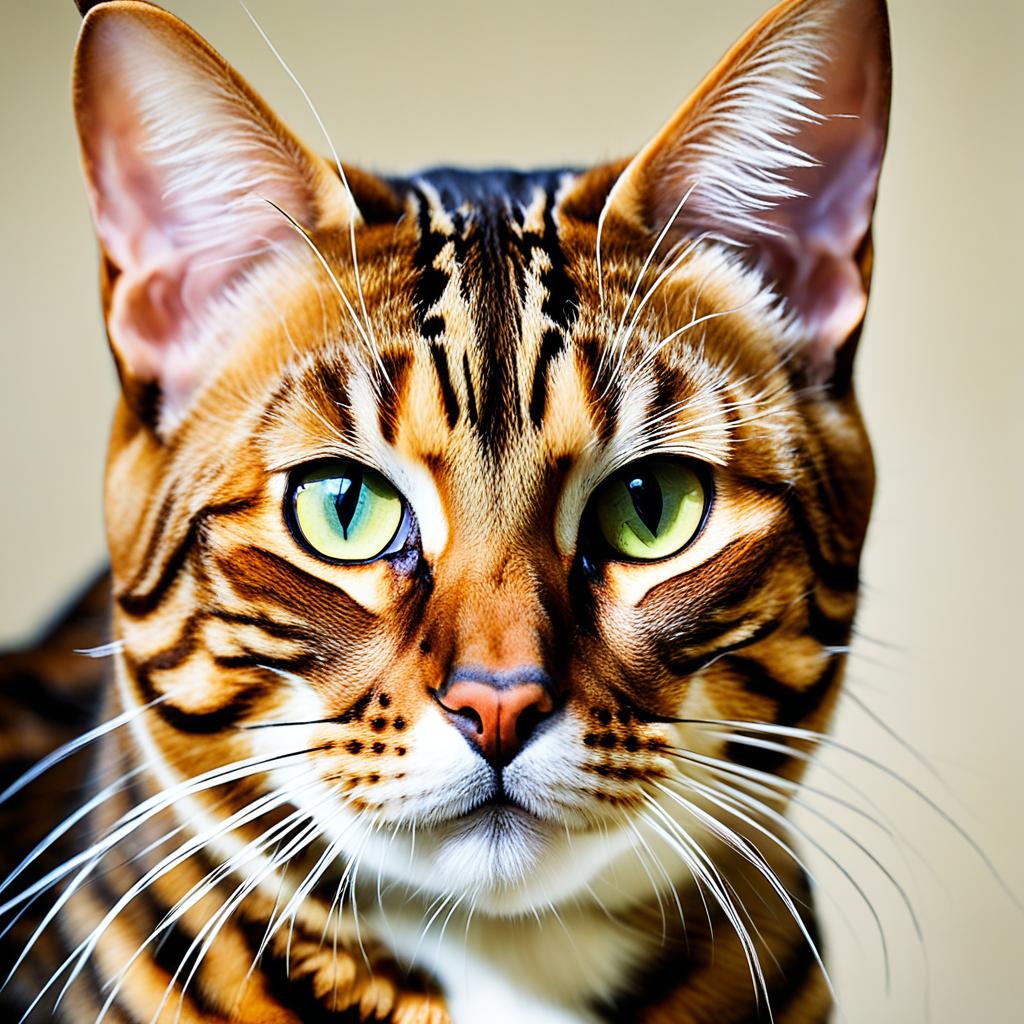
Watching what your Bengal cat eats is key to a healthy life. The right food keeps them strong, full of energy, and looking good.
Balanced Diet Preferences
Bengal cats need a balanced diet. This diet should be full of proteins, fats, and vitamins. Good food helps them stay active and boosts their immune system. Your vet can guide you on the best food for your cat.
Consistent Weight Maintenance
Keeping a Bengal cat’s weight in check is vital. A lean body means they’re more than likely very active. It’s also important not to overfeed them. Too much weight can cause health problems.
| Diet Component | Health Benefits |
|---|---|
| High-Quality Proteins | Builds and repairs muscle |
| Vitamins and Minerals | Supports immune system |
| Healthy Fats | Promotes a shiny coat |
| Controlled Caloric Intake | Maintains optimal weight |
Understanding Bengal cat health signs ensures they get the best nutrition. This keeps them lively and strong.
Spotting Health Issues Early in Bengal Cats

It’s essential to watch your Bengal cat’s health closely. This ensures a vibrant, long life. By recognizing a well Bengal cat, you’ll notice if something’s off. Catching health issues early can prevent big problems later.
Bengal cats love to play and are very active. If they suddenly stop or slow down, it might mean they’re not feeling well. Look out for changes in how much they eat and their overall health. Knowing these signs can let you know something is wrong.
- Bengal cats could have genetic issues like hypertrophic cardiomyopathy (HCM).
- Watch for progressive retinal atrophy (PRA), which can happen as well.
- They might also get patellar luxation, making it hard for them to move normally.
Make sure to take your Bengal cat to the vet often and for genetic tests. This helps find and deal with health issues early. This keeps your Bengal cat happy and full of energy.
| Health Issue | Symptoms | Preventive Measures |
|---|---|---|
| HCM | Lethargy, Breathing Difficulty | Regular Cardiovascular Check-Ups |
| PRA | Vision Loss, Disorientation | Genetic Testing, Eye Exams |
| Patellar Luxation | Limping, Abnormal Gait | Orthopedic Assessments |
Knowing about health issues and their early signs is key. It helps with recognizing a well Bengal cat and stepping in when they need help.
Signs of a Strong Bengal Cat’s Immune System
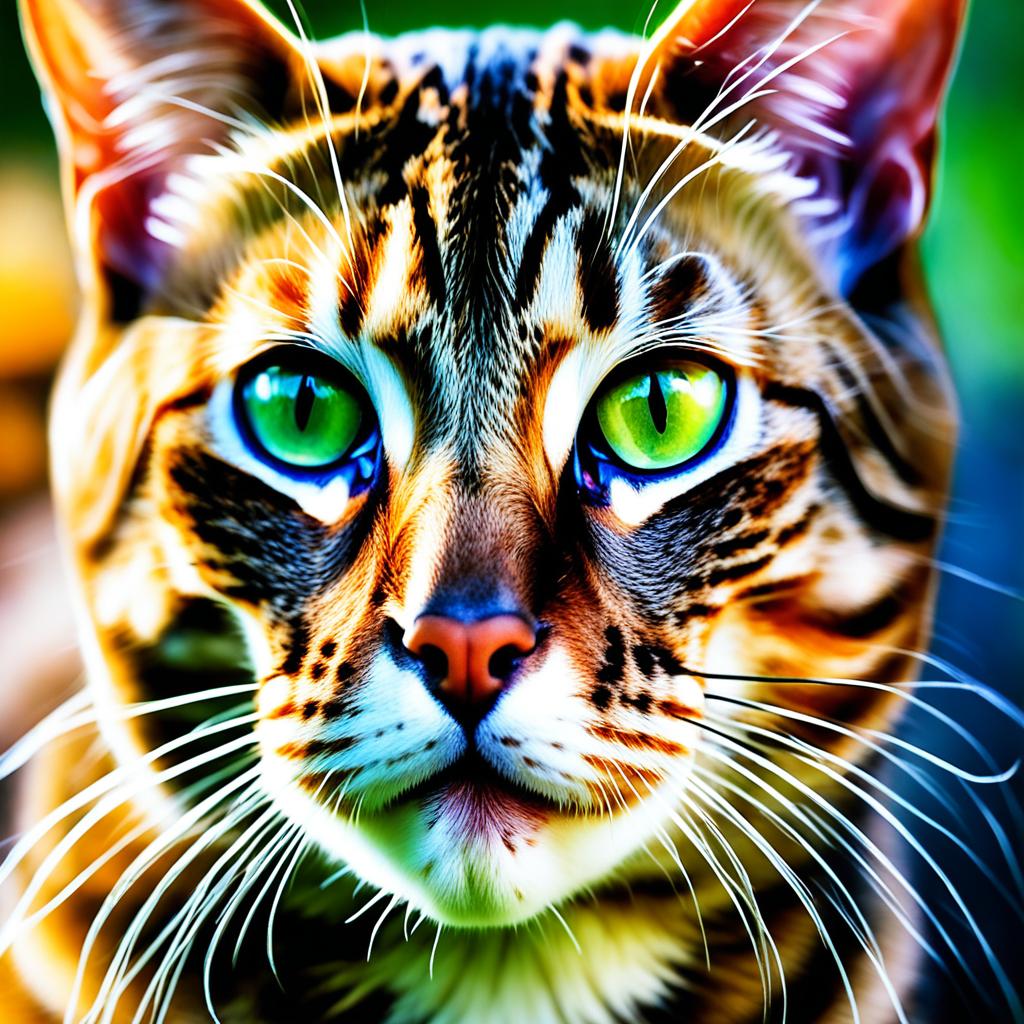
It’s crucial to know the signs of a healthy immune system in your Bengal cat. A strong immune system shows in how active and quickly they recover from small health issues. These include things like their energy levels and how fast they get over colds.
Regular Activity Levels
Cats show great health by playing and exploring often. A Bengal cat that loves activity is probably in top shape. This regular movement helps their immune system stand guard against diseases.
Recovery from Minor Illnesses
When your Bengal cat gets sick but bounces back fast, it’s good news. It means their immune system works really well. Paying attention to how quickly they get over small illnesses tells you a lot about their immune health.
| Indicator | Description |
|---|---|
| Regular Activity | Consistent engagement in physical activities and play |
| Quick Recovery | Swift bounce-back from minor illnesses |
How to Tell If a Bengal Cat Is Healthy by Its Eyes, Ears, and Nose
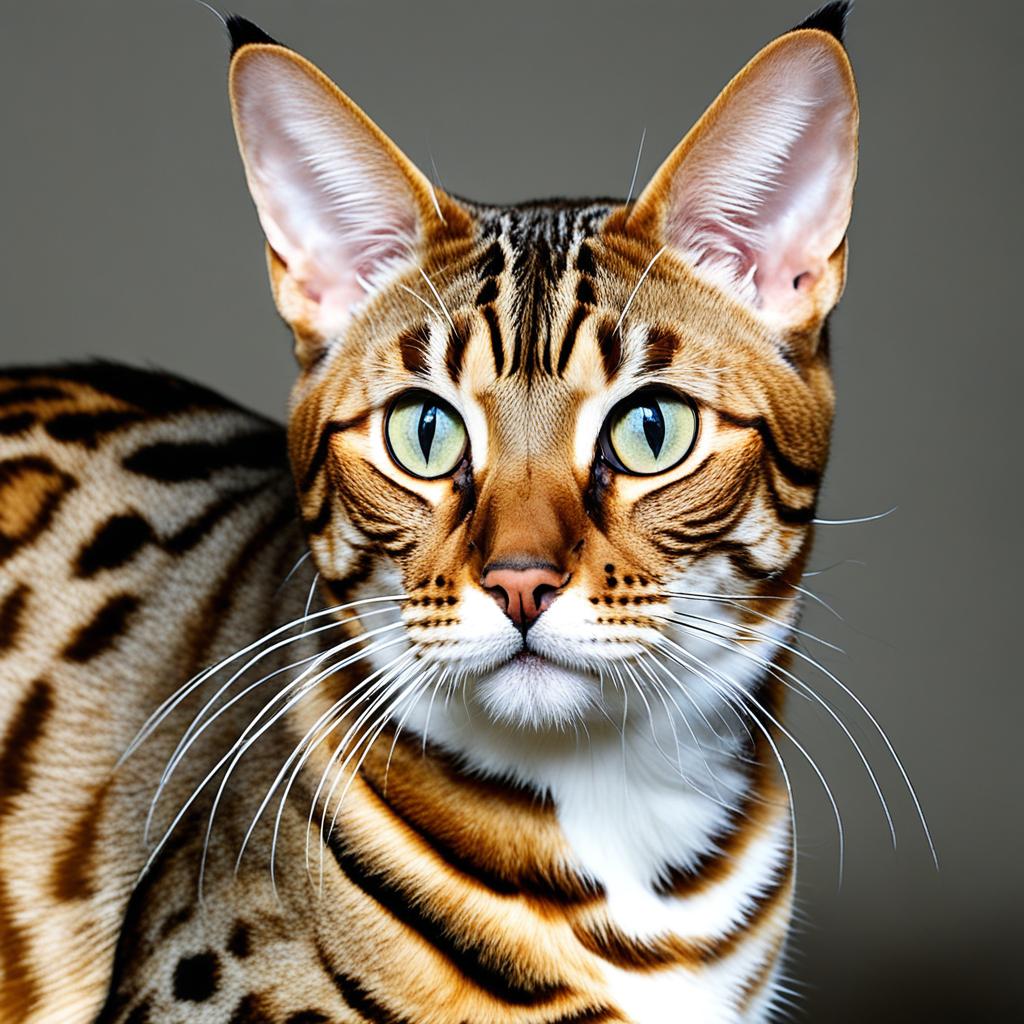
Looking at a Bengal cat’s eyes, ears, and nose can tell you a lot. By regularly checking these parts, you’ll spot a healthy Bengal cat easily. Keeping an eye on these areas helps in taking good care of them.
Clear Eyes
The eyes of a Bengal cat show their well-being. If their eyes are clear and don’t have any goo, that’s a good sign. But if they’re red or look cloudy, there might be health issues.
Clean Ears
Ears are another sign of a Bengal cat’s health. Healthy ears are clean and smell fine. Check for any dirt or odd smells to catch ear infections early.
Moist, Clean Nose
For a healthy Bengal cat, their nose should be both moist and clean. A dry or cracked nose could mean they’re not well. Look for any discharge as it might point to breathing problems.
| Health Indicator | Signs of a Healthy Bengal Cat |
|---|---|
| Eyes | Clear and bright without discharge |
| Ears | Clean, free of excess wax or debris |
| Nose | Moist and clean without discharge |
Monitoring Your Bengal Cat’s Dental Health
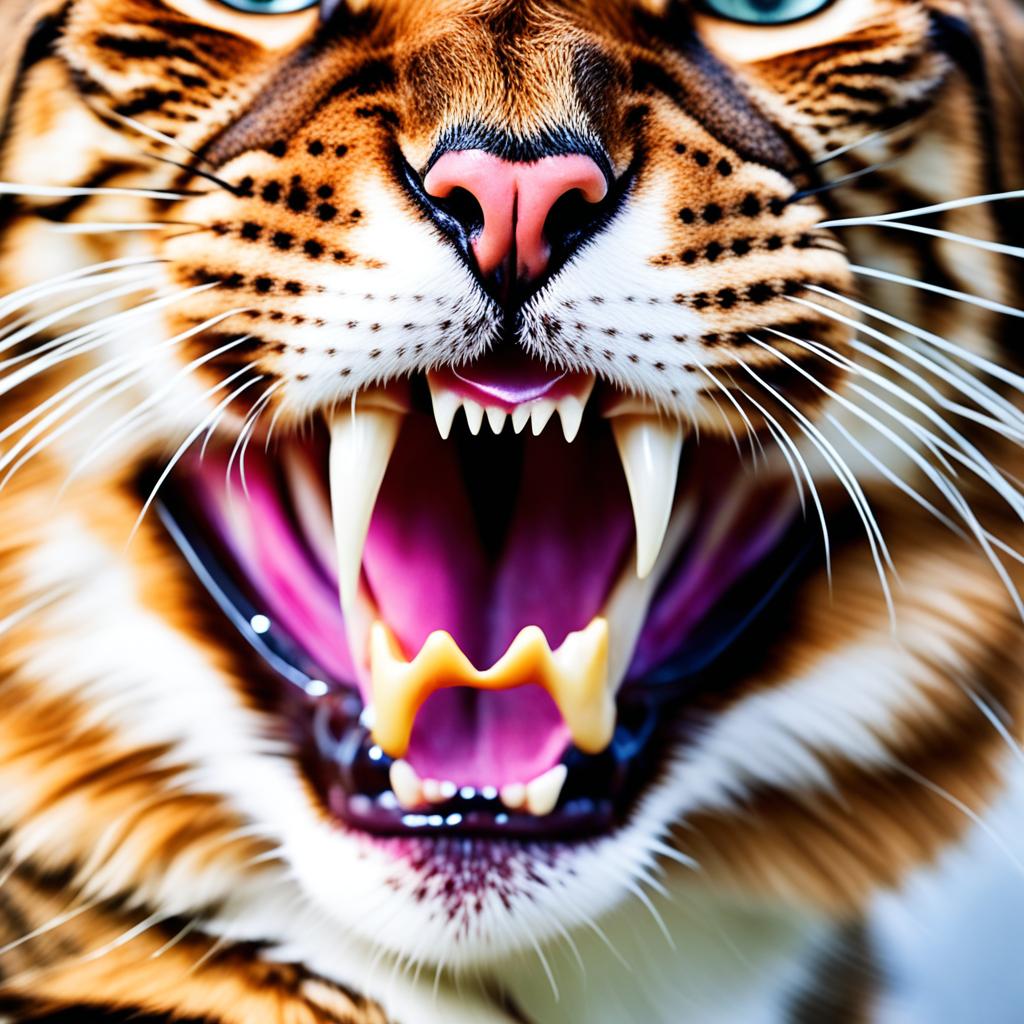
A Bengal cat’s smile shows more than cuteness. It’s a sign of good health. It’s essential to keep their teeth clean and their breath fresh.
Teeth and Gum Condition
Healthy Bengal cats have clean teeth and pink gums. Check their mouth for signs like tartar or redness. This can stop bigger health problems. Brush their teeth a few times a week and give them dental treats to keep their teeth healthy.
Breath Quality
Cat breath will never smell like a mint. But, very bad breath needs attention. It could mean your cat has dental or other health issues. Watch how their breath smells. This is important for their overall health.
Assessing a Bengal Cat’s Digestive Health
It’s vital to watch your Bengal cat’s tummy health. You can tell a lot from a few key signs. This keeps your cat happy and healthy.
Consistent Appetite
A steady hunger is a great sign in Bengal cats. If they eat well, they’re likely feeling good. Watch for any changes in how much they eat. This could hint at a problem that needs the vet’s touch.
Regular Bowel Movements
The way your Bengal cat poops can tell you a lot. Their litter should look pretty much the same each time. Too soft or too hard might mean trouble digesting. Talk to your vet if it doesn’t look right.
Feed your Bengal cat a good diet that meets AAFCO standards. And keep an eye out for any food or poop changes. Catching problems early can make a big difference.
| Digestive Health Indicator | Healthy Signs | Unhealthy Signs |
|---|---|---|
| Appetite | Consistent eating patterns | Fluctuations in hunger |
| Bowel Movements | Regular and well-formed stool | Irregular or distressed elimination |
Spotting Potential Genetic Health Issues Early
Taking steps to keep your Bengal cat healthy means being proactive. It’s important to know about possible genetic health issues. This way, you can watch for signs and make sure your pet sees the vet regularly.
Regular Vet Check-Ups
Regular vet visits are key to your Bengal’s wellbeing. They help catch any health problems early. This proactive approach keeps your cat strong and playful. Your vet can help you understand what signs to watch for.
Genetic Testing Awareness
Genetic tests can show if your Bengal is at risk for certain illnesses. They are especially good at finding inherited conditions. Knowing your cat’s genetic info helps tailor their care. Vets might suggest these tests for cats like Bengals.
Knowing about vet visits and genetic tests ensures you take the best care of your Bengal cat. This keeps their unique spirit shining bright.
Conclusion
Looking after a Bengal cat is mostly keeping a watchful eye on them. This involves both caring for their energy and being curious. You should watch their body, actions, and what they eat to stay healthy. They need a lot of attention to really do well.
To know if a Bengal cat is healthy, look at their shiny fur, bright eyes, and strong muscles. They need good food and regular teeth cleaning. This keeps them strong and ready to play.
Taking them to the vet often and knowing about their genes helps keep Bengals healthy. Start early and keep their space interesting. This will make sure your Bengal cat is happy and in good health.




